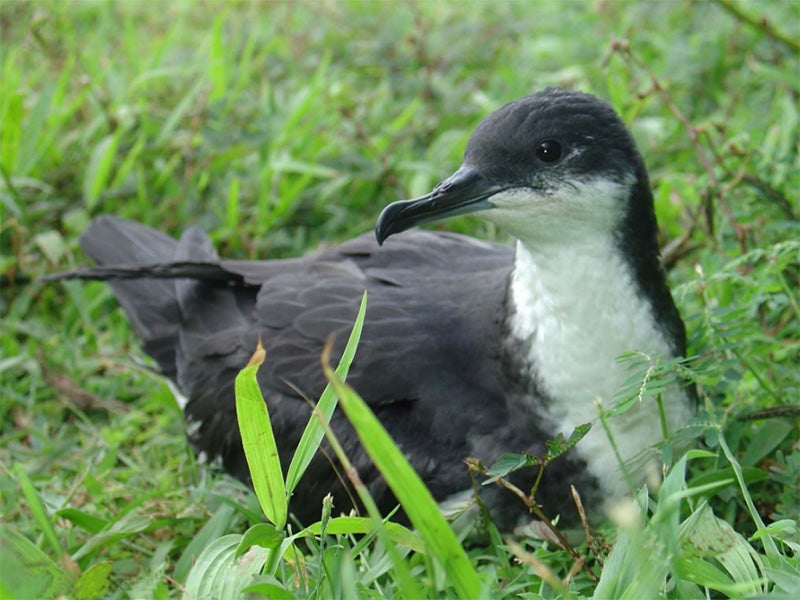Hawaiian Electric and Conservation Groups Reach Settlement to Protect Imperiled Seabirds
Hawaiʻi’s largest public utility makes additional commitments to address potential threats to seabirds from power lines on Maui and Lāna‘i, while pursuing permits under the federal Endangered Species Act and state law
Contact
On October 30, 2024, Hawaiian Electric reached a three-year agreement with Conservation Council for Hawai‘i and American Bird Conservancy, which are represented by Earthjustice, to provide additional, immediate protections for endangered and threatened Hawaiian seabirds in Maui County while the utility works with wildlife agencies on longer-term solutions. In a settlement with the conservation groups, Hawaiian Electric has committed to several measures in addition to those it has already taken aimed at reducing the risk of harm to seabirds posed by collisions with the company’s power lines on Maui and Lāna‘i.
The endangered ‘ua‘u (Hawaiian Petrel) and threatened ‘a‘o (Newell’s Shearwater) are endemic to Hawai‘i (i.e., these species do not breed anywhere else on Earth). These native seabirds fly out to sea and back to their nests at night and sometimes collide with power lines. Under the settlement, in 2024 and 2025, Hawaiian Electric will:
- Install diverters on power lines on Maui and Lāna‘i located in areas identified as potential seabird flyways, which will make the lines easier for the birds to see and avoid;
- Continue to pursue and expedite its existing long-term project to lower power lines at the top of Haleakalā, near where the largest remaining ‘ua‘u colony is found;
- Provide over $480,000 per year in funding for a project to monitor and enhance ‘ua‘u habitat in the Nākula Natural Area Reserve and Kahikinui Forest Reserve on Maui; and
- Continue its ongoing plan to conduct additional studies of the impacts on imperiled seabirds of its power lines in Maui County.
“With this agreement, we are making critical progress in the fight to save these native birds, which are part of our natural and cultural heritage and have been threatened with extinction for decades,” said Jonee Peters, Executive Director of Conservation Council for Hawai‘i. “While there is still much work to be done to protect these species, we appreciate Hawaiian Electric’s willingness to engage with us and take action on these immediate and longer-term protections.”
In addition to undertaking projects to benefit ‘ua‘u and ‘a‘o, Hawaiian Electric will continue its ongoing commitment to secure permits from the U.S. Fish and Wildlife Service and State of Hawai‘i Division of Forestry and Wildlife to address the harm from power lines on Maui, as required by the federal Endangered Species Act and state law. As part of the permitting process, Hawaiian Electric also will continue to develop the habitat conservation plan (HCP) it committed to in 2022 to reduce and offset the impacts of power-line collisions on imperiled seabirds.
“This settlement demonstrates the benefits of working through our differences in good faith and coming together for the common good,” said Brad Keitt, American Bird Conservancy’s Oceans and Islands Director. “We hope that other businesses and entities facing similar issues will follow Hawaiian Electric’s lead and do what’s right for Hawai‘i’s endangered and threatened species.”
“Hawaiian Electric’s commitment to protecting Hawai‘i‘s seabirds aligns with our efforts to be good stewards of our island environment while providing reliable electric service,” said Mathew McNeff, Hawaiian Electric’s director of Maui County. “This agreement includes commitments to add further protections minimizing potential impacts and projects that will help increase seabird populations while the company fulfills its long-term, ongoing commitment to produce a habitat conservation plan and obtain the related permits. We appreciate the collaboration with agency partners and conservation organizations to ensure native seabirds survive and flourish.”
In January 2024, the conservation groups notified Hawaiian Electric and Maui County of their intent to file a lawsuit to address the ongoing harm to imperiled Hawaiian seabirds from power-line collisions while the HCP and permit applications are pending and from grounding of seabirds alleged to be from the attraction to streetlights that Hawaiian Electric owns and operates on behalf of Maui County. While Hawaiian Electric adds diverters to lines and is engaged in active investigation on Lānaʻi, the settlement defers the question of whether Hawaiian Electric requires an Endangered Species Act permit for its power lines on Lāna‘i. The dispute about harm to seabirds caused by streetlights on Maui and Lāna‘i will be resolved in ongoing negotiations or through litigation that will include the County of Maui. Although a complaint will be filed against Hawaiian Electric in federal court with regard to the power-line issues, that filing is only intended to provide the court with jurisdiction to enforce the October 30, 2024 settlement. Assuming that the court approves the settlement, the case would immediately be dismissed.
“We appreciate Hawaiian Electric’s willingness to work with us to reach a settlement that gives the ‘ua‘u and ‘a‘o the best chance for survival and recovery,” said Earthjustice Attorney David Henkin, who represents the conservation groups. “It’s long past time for Maui County to do the same and address the ongoing harm that the County’s streetlights inflict on these critically imperiled species.”

Additional Resources
About Earthjustice
Earthjustice is the premier nonprofit environmental law organization. We wield the power of law and the strength of partnership to protect people's health, to preserve magnificent places and wildlife, to advance clean energy, and to combat climate change. We are here because the earth needs a good lawyer.